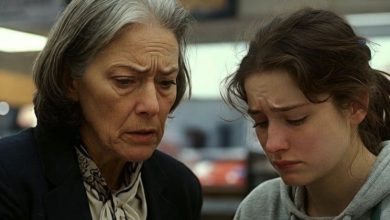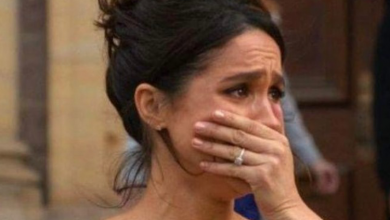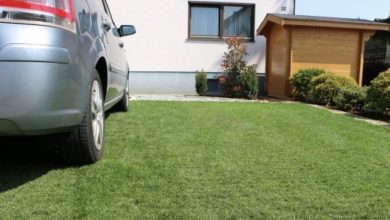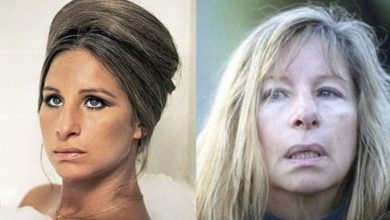“Absolutely! Invite them to the dacha for just one day, and you won’t see the back of them for a week!” the mother-in-law scowled at the visitors.
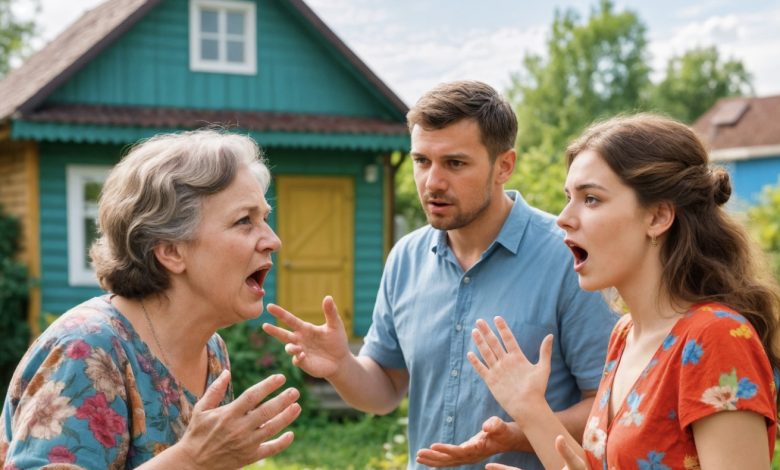
— Of course! Let you come to the dacha for one day, and then you won’t be able to get rid of them for a week! — the mother-in-law frowned at the guests.
“Let’s go to your mom’s,” Katya said, placing her cup in the sink and turning to her husband. The morning light fell on her face, highlighting the faint wrinkles of fatigue near her eyes. “We haven’t been to see her in a while.”
Andrey didn’t lift his eyes from his smartphone. Something tightened in his chest — a familiar, heavy foreboding. He felt like someone being asked to enter a room where an unpleasant conversation was surely waiting.
“Why? She’s at the dacha. She’s not up to us right now.”
“All the more reason!” Katya sat on the edge of the chair opposite him, her eyes shining with enthusiasm that Andrey both knew and feared. “Imagine how beautiful it is there! We’ll grill some kebabs and breathe the fresh air. And your mom will be glad.”
Andrey finally looked up. Something anxious, almost frightened, flickered in his eyes. He saw not a wife but a person about to enter a cage with a sleeping tiger, sincerely believing the beast would wake up in a good mood.
“Katya, you know my mother. She has… a difficult character. Especially at the dacha. There she’s a queen and a goddess. We’ll only spoil our own mood.”
But even as he said this, Andrey knew it was useless. In family life, there are moments when logic is powerless against impulse, against the desire to do something good, even if reason suggests otherwise.
“Oh, come on!” Katya waved her hand lightly, as if brushing away a pesky fly. “We’ll just stop by, see how she’s doing. Maybe she needs some help.”
“She doesn’t need help. But she’ll get tired of us in five minutes.”
Inside Andrey, two people were battling: a son who still feared his mother’s disapproval, and a husband who wanted to protect his wife from what awaited them. This inner war was familiar — it had started many years ago and was still ongoing.
Katya was already on her feet, eyes sparkling with anticipation. Her enthusiasm was touching and at the same time frightening — she didn’t know his mother as he did. For her, Raisa Petrovna was just an elderly woman living alone, who perhaps felt lonely.
“Andryush, please! When was the last time we got out of town? We’ll buy meat, vegetables. Just one day, only one day!”
Andrey turned off his phone, staring out the window for a long time. Birch branches swayed outside, their movement hypnotic and calming. He thought about how to explain to his wife what even he didn’t fully understand. How to tell her about the fear that gripped him every time he thought about meeting his mother? About the guilt that had accompanied him since childhood and seemed never to let go?
Something tightened in his chest at the thought of the conversation that awaited them. He already pictured his mother’s face — displeased, suspicious. Heard her voice full of reproaches and complaints. And the worst — he knew that deep down, some of her reproaches would be justified.
“Alright,” he sighed heavily, the weight of the coming day in that breath. “But don’t say later I didn’t warn you.”
Katya was already making plans, listing what to take, and arguing with her was pointless. Andrey looked at her and thought how love sometimes makes us blind to danger. His wife did not see the pitfalls he knew by heart.
The drive to the dacha took two hours, but for Andrey time dragged painfully slow. Every kilometer brought him closer to the meeting he subconsciously feared. Katya chatted about the day’s plans, and he nodded and answered shortly, lost in anxious thoughts.
The old “nine” (car model) struggled up the dirt road. Dust rose in a column, settling on the windshield. Katya nervously adjusted her hair, gazing at the gardens on both sides. Now that the goal was near, her enthusiasm mixed with worry.
“What if she’s not home?”
“She is,” Andrey answered gloomily. “Where else would she go?”
His voice carried the certainty of someone who knows another’s habits inside out. His mother never left the dacha without extreme necessity. For her, this plot was not just a garden — it was her world, her fortress, her way to control at least something in life.
His mother’s plot was visible from afar — neat beds, shiny plastic greenhouse. Everything indicated a person who viewed order not just as a habit but a life philosophy. Every plant knew its place, every tool lay where it should.
Andrey parked by the gate and turned off the engine. In the silence that settled, his heartbeat was audible. He sat with his hands on the steering wheel, gathering courage. Katya looked at him in surprise — she saw her husband so tense for the first time.
“Mom!” he shouted, climbing out of the car. His voice sounded too loud in the summer quiet.
The gate creaked, and from behind the currant bushes appeared a short, stocky woman in a faded robe. Raisa Petrovna moved slowly but with an inner strength, the stubbornness of someone used to relying only on herself. Her face was stern, lips pressed into a thin line.
“Oh,” she stopped, crossing her arms. “So you’ve arrived.”
There was so much cold in these simple words that Katya felt something tighten in her stomach. She expected surprise, maybe slight displeasure, but not such open hostility.
“Hi, Mom,” Andrey stepped closer but didn’t dare kiss her. His movements carried the uncertainty of a teenager unsure how to behave with a parent. “How are you? How’s your health? We decided to stop by for a day.”
“Of course!” Raisa Petrovna frowned at the guests. “Let you come to the dacha for one day, and then you won’t get rid of them for a week!”
These words hurt Katya deeply. She froze by the car, unsure whether to approach. The thought ran through her mind: “Why? We haven’t done anything wrong!”
“We just came to check on you,” she said quietly, with hints of hurt in her voice.
“Check on me!” Raisa Petrovna snorted, sarcasm in her voice turning the word almost into an insult. “I know your ‘check on.’ Maria Ivanovna’s nephew and his wife came ‘to check on’ her. Stayed the whole summer! Trampled everything, broke the greenhouse, ate all the cucumbers. And when they left — didn’t even say thanks!”
Andrey listened to his mother’s words and felt a familiar mixture of shame and anger rising inside. Shame that his mother behaved like that toward his wife. Anger at himself for letting this happen. And a deeper feeling — painful realization that his mother’s words were not just about the neighbors. There was fear that even her own son might turn out to be ungrateful.
“Mom, we’re not…” Andrey began, but his voice was uncertain.
“Not what? Not going to run the place? Not going to tell me how to live? I have order here, everything in its place. And you’ll come like locusts, disturbing everything!”
Katya felt her cheeks burn. She wanted to turn and leave right now, but her feet seemed glued to the ground. She looked at her mother-in-law, thinking how she could have been so wrong about a person.
“We brought meat,” she weakly said, clutching at the last straw of hope. “Wanted to grill kebabs.”
“Kebabs!” Raisa Petrovna threw up her hands, her voice filled with outrage bordering on panic. “And if something catches fire? Who will be responsible?”
In her fear was something irrational but understandable. It was the fear of a person who had fought all her life for her small world and now saw every stranger as a potential threat to it.
Andrey stood with his head down, feeling betrayed by his own emotions. At that moment, he was again the ten-year-old boy being scolded for a broken window. All his adult achievements, all his confidence evaporated under his mother’s gaze.
“Mom, if you don’t want to see us, we’ll leave,” he said quietly, old childhood resentment in his voice.
“You’ll leave?” There was a strange note in his mother’s voice, a mixture of surprise and something else hard to define. “You come here uninvited, and now you’re offended too!”
A heavy silence hung. The tension was almost tangible. Katya swallowed hard, trying to hold back tears. All dreams of a quiet family evening out of town crumbled into dust, leaving only bitterness and bewilderment.
Andrey looked at his mother and wife, conflicting feelings wrestling inside him. Part of him wanted to protect Katya, take her far away. The other — the son forever — searched for a way to reconcile with his mother, to earn her approval.
“Maybe we should come in after all?” he suggested uncertainly, a plea in his voice. “You can see what we brought.”
Raisa Petrovna studied their faces for a long time, and something changed in her gaze. Anger slowly gave way to fatigue, hostility to curiosity. She saw before her two grown people who looked lost and hurt, and something in her heart stirred.
“Come in then!” she said sharply, turning toward the house. “Since you came. Just don’t touch anything!”
She strode along the path, and the couple slowly followed her. The plot greeted them with silence and order — every plant knew its place, every path was carefully swept. The hand of a hostess was felt here, someone who put not only effort but soul into her work.
“How can we help?” Katya asked, looking around, trying to find a way to build bridges.
“Nowhere!” Raisa Petrovna barked, but the harshness in her voice was gone. “Eat your kebabs and get lost. I’ve got enough worries without you.”
But a minute later she was already complaining, and in her complaints was less a request for help and more a need to be heard:
“The gate barely closes. Tried fixing it so many times — can’t. And the greenhouse plastic tore in the wind yesterday. Haven’t had time to patch it.”
Andrey silently went to the gate. His movements showed the determination of someone who found a way to express his feelings through action. He fiddled with the hinges, adjusted the latch, checked the lock. His movements were sharp, angry — all the pent-up resentment pouring out in work.
Meanwhile, Katya inspected the greenhouse. The plastic was indeed torn in several places, edges fluttering in the wind.
“Do you have tape?” she asked, her voice without reproach — just a desire to help.
“In the shed,” Raisa Petrovna grumbled, but her tone softened noticeably.
They worked in silence, each lost in their thoughts. Andrey thought about how strangely life is arranged — sometimes the simplest things help say what words cannot. Katya reflected that behind the mother’s rudeness might hide loneliness and fear. And Raisa Petrovna watched them from the window, feeling something warm beginning to stir in her chest.
She kept peeking out, mumbling something grumblingly but not interfering. In her gaze were curiosity and something else — maybe gratitude she was not yet ready to admit.
By evening, the gate was fixed, the greenhouse patched. Andrey carefully lit the barbecue — away from the beds, as he had done in childhood under his mother’s watchful eye. The smell of grilled meat spread over the plot, mixing with the aromas of flowers and herbs.
“Where should we set up?” Katya asked, her voice no longer bitter.
“There’s a table on the veranda,” Raisa Petrovna replied reluctantly, but there was an invitation in her words.
The veranda was cozy, furnished with old but sturdy furniture. When everyone sat down and Katya started putting meat on plates, the mother-in-law suddenly stood and disappeared into the garden.
She returned with a huge bowl of fresh cucumbers and tomatoes, still warm from the sun, smelling of earth and summer. There was some awkwardness in her movements — she wasn’t used to such gestures.
“Take these,” she said, avoiding eye contact. “From my garden. Tasty.”
In that simple gesture was more reconciliation than in any words. Katya felt her heart tighten with unexpected tenderness. She realized that behind the rough shell was a person who simply didn’t know how to express her feelings otherwise.
They ate in silence, but the silence was no longer oppressive, but peaceful. Only occasionally did Raisa Petrovna quietly ask:
“Enough tomatoes? Want me to pick more? How are the cucumbers? Sweet?”
In her questions was the care she had long hidden under a mask of displeasure. Andrey looked at his mother and wife, and something changed in his soul.
The sun set behind the trees, painting the sky in soft pink tones. The air cooled, filled with evening scents. It was time to leave, but no one hurried — everyone understood that this day had changed something between them.
“Thanks for dinner,” Andrey said, getting up from the table, sincere gratitude in his words.
Raisa Petrovna suddenly grabbed his sleeve. There was desperation in her movement — someone who realizes they might miss an important moment.
“Andryusha,” her voice trembled, carrying years of pent-up emotions. “Forgive me, old fool. I don’t know what came over me. I snapped at you like a chained dog as soon as you came in.”
She turned away, wiping a tear with the back of her hand. In that gesture was all her pride and shame for her own weakness.
“The neighbors tell all sorts of stories about uninvited relatives. How they come without asking, run the place, ruin everything. But you’re not like that. You’re good kids.”
Andrey hugged his mother — awkwardly but firmly. In those embraces was forgiveness for all the offenses, the understanding that love sometimes shows itself in strange ways.
“Mom, we just wanted to see you. We missed you.”
“I know, I know,” she sobbed, regret in her voice. “I’m stupid… Those neighbors… they probably lie a lot. They’re too talkative, love to exaggerate.”
Katya stepped closer and hugged her mother-in-law too. In that embrace was acceptance — she now understood that behind the mother’s harshness was fear of loneliness and a need for love.
“Will we come again?” she asked hopefully.
“Come,” Raisa Petrovna squeezed her hand tightly. “Just warn me ahead. I’ll bake pancakes, cook borscht. We need to celebrate properly. Today was like a snowstorm out of nowhere.”
They left when it was already quite dark. The way home seemed different — not so long and burdensome. In the rearview mirror, Andrey saw his mother standing by the gate, waving, her silhouette touching and lonely.
Something warm spread through his chest — for the first time in many years, he didn’t feel guilty toward her.
“Shall we go again?” Katya asked quietly, looking out at the fields passing by.
“We will,” he replied, and his voice no longer held the old anxiety. “Definitely. But we’ll warn her first.”



